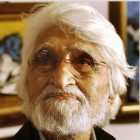MF Husain: Farewell to a nation’s chronicler
 For almost 20 years, artist MF Husain was threatened and his work abused. Salil Tripathi says goodbye to a controversial and spell-binding master (more…)
For almost 20 years, artist MF Husain was threatened and his work abused. Salil Tripathi says goodbye to a controversial and spell-binding master (more…)
 For almost 20 years, artist MF Husain was threatened and his work abused. Salil Tripathi says goodbye to a controversial and spell-binding master (more…)
For almost 20 years, artist MF Husain was threatened and his work abused. Salil Tripathi says goodbye to a controversial and spell-binding master (more…)
It was ironic that artist Xenofon Kavvadias’ show exploring the “limits of acceptability and the margins of legality under counter terrorism legislation” opened last night, as the world is still is reeling in shock at the mother of all counter-terrorist acts. The show takes as its subject what governments do (and have always done) in the name of security. Kavvadias has conducted five years of careful research into why some texts are deemed too dangerous to read and own. (more…)
Ten years in the making and with a price tag of US$400m, the freshly-opened National Museum of China on the eastern edge of Tiananmen Square may be the world’s biggest museum. Unarguably grand architecturally, its permanent exhibition on China’s modern history –– tagged “The Road to Rejuvenation” — is predictably propagandistic, full of self-aggrandisement and angry xenophobia, and, worst of all it is terribly dreary.
A lesson to us all, that Chinese censorship’s worst crime may now be its lack of creativity.
There are few hands-on exhibits, the only noteworthy one being an interior mock-up of the Qinghai-Tibet railway, where you can sit in the driver’s seat and watch videos of Tibetan antelope leap for joy on the plateau. The driver’s knobs, unfortunately, don’t work. The rest of the exhibits are made up of photos and small eclectic collection of objects such as Deng Xiaoping’s cowboy hat and a small steel ox ornament to commemorate the opening of the Shanghai Baoshan Iron and Steel Plant.
Needless to say, the mistakes of the Party are ignored. Whilst The Great Leap Forward gets one photo, three are lavished on the Cultural Revolution (see below). Much is made about China’s first space orbit, its first atomic weapons test and its recently concluded Olympic Games (although I had expected more of an emphasis on the latter).
I skipped the 5,000 years of glorious history and the evils of the Opium Wars, and jumped right into the birth of the Chinese Communist Party –– “an earth-shattering event!”
Here’s the man who started it all.
There’s a lot about Mao but not very much about the Great Leap Forward and the Cultural Revolution, two tragic movements under his leadership.
Here’s the sole photo on the Great Leap Forward, launched in 1958. According to the caption, the natural rules of economics were “overlooked.”
And here’s what the museum has to say about the 10-year Cultural Revolution. The two bottom photos are both about the Gang of Four, the group which was headed by Mao’s wife and conveniently blamed for the decade of chaos.
China’s first astronaut, Yang Liwei, gets a lot more space (sic). Here’s his diary.
And here he is suited up.
A bit of light relief: First Deng’s cowboy hat.
And now the pig.
And let’s not forget the happy ethnic minorities. Here are some very happy Tibetans voting.